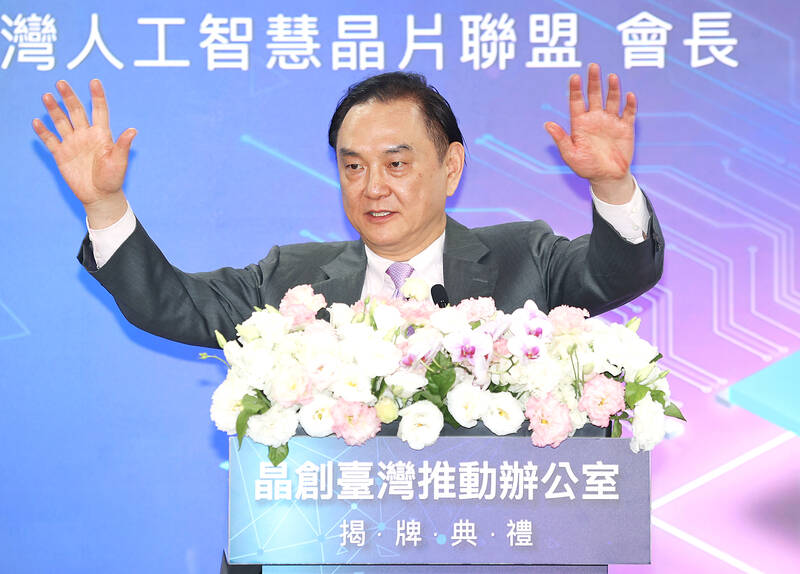Taiwan should extend the retirement age to keep talent in the tech industry to help train younger people as well as offer more incentives to attract foreign workers, AI on Chip Taiwan Alliance chairman Nicky Lu (盧超群) said in Taipei on Tuesday.
Speaking at the launch of the office of the Chip-based Industrial Innovation Program, Lu said that artificial intelligence (AI) is both a blessing and a challenge for Taiwan.
“We are facing an era where major corporations such as Microsoft Corp are trying to change the horizontal division of labor back to vertical integration,” he said, referring to brand companies’ plans to manufacture chips themselves.

Photo: CNA
However, Taiwan is ever-ready to take on the challenges, said Lu, who is also the chairman of memorychip supplier Etron Technology Inc (鈺創科技).
“We don’t just have pure-play foundries, but also offer heterogeneous integration, chip packaging and heat dissipation technology” — a whole semiconductor manufacturing chain that cannot be easily relocated, he said.
Taiwan has come this far by finding the “tipping point” in the industry, such as Taiwan Semiconductor Manufacturing Co’s (台積電) pure-foundry strategy, Lu said, adding that in the AI era, Taiwan should strive to do the same.
However, a shortage of workers is a problem, which the office plans to address, Lu said.
“People live longer nowadays; the US has raised the retirement age for full benefits from 65 to 67. The Taiwanese government should also use incentives to attract people nearing 65 to stay in their positions until 70,” Lu said.
The government could also consider expanding the substitute military service to allow more young people to be trained in the tech sector, he said.
Smart deployment of AI can also raise the efficiency of the workforce, he added.
Powerchip Semiconductor Manufacturing Corp (力積電) chairman Frank Huang (黃崇仁), one of the speakers at the event, also addressed the workers’ issue, suggesting that the government set up a “green card” system to attract foreign workers.
Huang said he had been approached by India, Vietnam and Saudi Arabia to discuss technology transfers, and had told them that “they can send their students here for training.”
The semiconductor schools that Taiwan has been setting up in recent years can help train foreign talent and “keep half of them in Taiwan,” he added.

When an apartment comes up for rent in Germany’s big cities, hundreds of prospective tenants often queue down the street to view it, but the acute shortage of affordable housing is getting scant attention ahead of today’s snap general election. “Housing is one of the main problems for people, but nobody talks about it, nobody takes it seriously,” said Andreas Ibel, president of Build Europe, an association representing housing developers. Migration and the sluggish economy top the list of voters’ concerns, but analysts say housing policy fails to break through as returns on investment take time to register, making the

EARLY TALKS: Measures under consideration include convincing allies to match US curbs, further restricting exports of AI chips or GPUs, and blocking Chinese investments US President Donald Trump’s administration is sketching out tougher versions of US semiconductor curbs and pressuring key allies to escalate their restrictions on China’s chip industry, an early indication the new US president plans to expand efforts that began under former US president Joe Biden to limit Beijing’s technological prowess. Trump officials recently met with their Japanese and Dutch counterparts about restricting Tokyo Electron Ltd and ASML Holding NV engineers from maintaining semiconductor gear in China, people familiar with the matter said. The aim, which was also a priority for Biden, is to see key allies match China curbs the US

NOT TO WORRY: Some people are concerned funds might continue moving out of the country, but the central bank said financial account outflows are not unusual in Taiwan Taiwan’s outbound investments hit a new high last year due to investments made by contract chipmaker Taiwan Semiconductor Manufacturing Co (TSMC, 台積電) and other major manufacturers to boost global expansion, the central bank said on Thursday. The net increase in outbound investments last year reached a record US$21.05 billion, while the net increase in outbound investments by Taiwanese residents reached a record US$31.98 billion, central bank data showed. Chen Fei-wen (陳斐紋), deputy director of the central bank’s Department of Economic Research, said the increase was largely due to TSMC’s efforts to expand production in the US and Japan. Investments by Vanguard International

‘SACRED MOUNTAIN’: The chipmaker can form joint ventures abroad, except in China, but like other firms, it needs government approval for large investments Taiwan Semiconductor Manufacturing Co (TSMC, 台積電) needs government permission for any overseas joint ventures (JVs), but there are no restrictions on making the most advanced chips overseas other than for China, Minister of Economic Affairs J.W. Kuo (郭智輝) said yesterday. US media have said that TSMC, the world’s largest contract chipmaker and a major supplier to companies such as Apple Inc and Nvidia Corp, has been in talks for a stake in Intel Corp. Neither company has confirmed the talks, but US President Donald Trump has accused Taiwan of taking away the US’ semiconductor business and said he wants the industry back